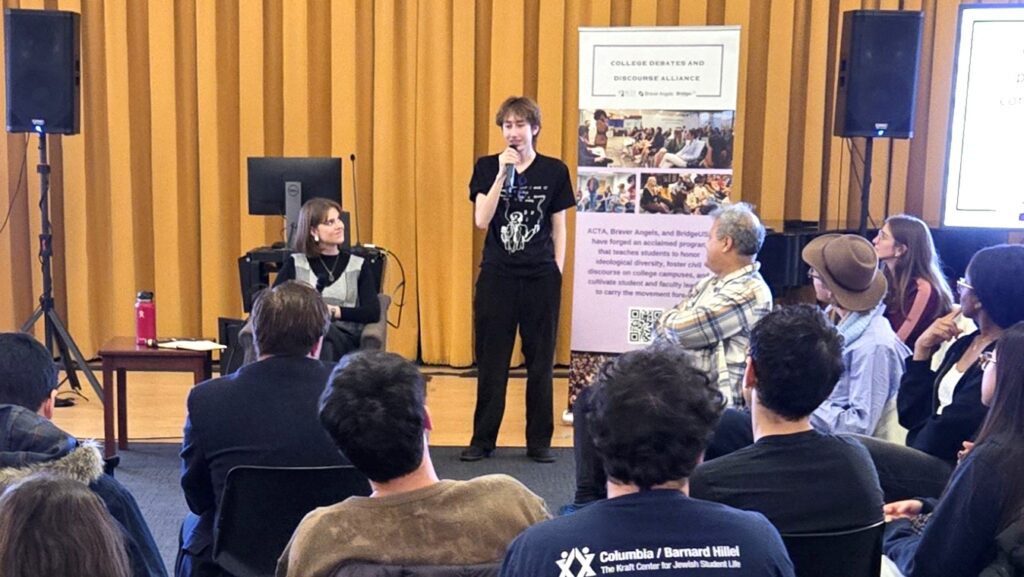This past spring semester, the College Debates & Discourse (CD&D) Alliance organized and hosted more than 80 campus debates and dialogues, engaging several thousand students at partner institutions across the nation. In total, these events covered a panoramic range of topics and elicited a myriad of student perspectives. A key shared takeaway has emerged: students, faculty, and community members attest that in today’s sharply divided political climate, it is more crucial than ever that universities remain strongholds of free speech and open dialogue.

Working to meet this challenge is never easy, but it is highly rewarding. Often after chairing a debate or dialogue workshop, our team members report that they feel at once exhausted, exhilarated, and wide awake. The vibrant energy that fills a room as students nearly jump out of their seats to ask questions and give speeches creates a sort of adrenaline rush. It is truly remarkable to witness genuine exchanges of ideas and intensely personal expressions of empathy and humility. Showing up to lectures about civil discourse, intellectual humility, or ideological diversity is one thing, but successfully practicing it is something entirely different. For many campus members, this is a new experience.
National surveys of students and faculty have cast a spotlight on their reluctance to discuss controversial political and social topics. The pervasive culture of fear across campuses can feel overwhelming. Students with widely varying perspectives are increasingly afraid to speak up, unsure if participation in political advocacy or the expression of their beliefs will bring about social repercussions, or worse.
Nick, a student leader of the BridgeUSA chapter at Columbia University, explains,
“I think there’s been a profound kind of resistance to enter these conversations, whether it be like, ‘Oh, this is going to be very uncomfortable. I don’t want to get into this,’ or ‘No, I feel like I’m right, so why should I? Why should I normalize the other side’s point of view and attempt to engage with them?’ And so I think there’s a reluctance of discomfort and then one of hubris.”
During a workshop with members of the BridgeUSA chapter at New York University that focused on the question, How should the U.S. support Israel and/or Palestine moving forward?, a student stood up and left the room, worrying that the event was being recorded. After being assured that this was not the case, the student returned and summoned courage to share deep and personal viewpoints on the issue. During the concluding group reflection, that student expressed gratitude for the opportunity to listen, learn, and share without backlash on a topic that has torn many campuses apart.
Samuel, a CD&D student fellow at the University of North Carolina–Wilmington, offers a similar perspective. “In today’s political climate, I think the average person is afraid to share their beliefs in fear of scrutiny,” he says.
“I myself didn’t feel comfortable sharing my views before working with CD&D. . . Now I can visibly see the change myself. The amount of positive feedback I’ve received from friends and other students who tell me they finally feel comfortable talking about the issues that matter to them is amazing. . . . Many students find it shocking to be in such a nurturing environment for respectful discussion.”
Sitting in a roomful of people with conflicting perspectives can be unnerving, and listening to someone you vehemently disagree with can be nothing short of infuriating. Sharing the deeply personal stories that influence your social and political ideology with a group of strangers can feel like a dystopian episode of Fear Factor. But these are precisely the kinds of experiences that young people need to develop the humility and empathy so crucial for navigating the diverse voices and perspectives they will encounter once they step off campus.
In a debate at the University of North Carolina–Chapel Hill, students discussed, Should universities comply with ICE? Urgent questions were raised: Should international students be awarded the same Constitutional protections as U.S. citizens? Should students who express “anti-American” views risk losing their visas? And more importantly, who gets to define what “anti-American” means?
One speaker stood up to describe and explore a “tension between justice and practicality.” Should universities protect student speech, even when it includes dissenting views that challenge the narrative of the federal administration? Or should they prioritize compliance in order to preserve federal funding so essential in supporting a diverse student body and maintaining critical research?
The right to express dissent is one of the most fundamental American values and remains critical to maintaining the integrity of our academic institutions. Against the backdrop of campus protests and volatile climate in higher education, colleges and universities should encourage their students to ask tough questions, embrace having their perspectives challenged, and build capacity to listen attentively to others with differing views.
Sadie Webb is ACTA’s Associate Director of the College Debates and Discourse Alliance.
WHO WE ARE
Launched in 1995, we are the only organization that works with alumni, donors, trustees, and education leaders across the United States to support liberal arts education, uphold high academic standards, safeguard the free exchange of ideas on campus, and ensure that the next generation receives an intellectually rich, high-quality college education at an affordable price.
Discover MoreSTAY INFORMED
Sign up to receive updates on the most pressing issues facing our college campuses.